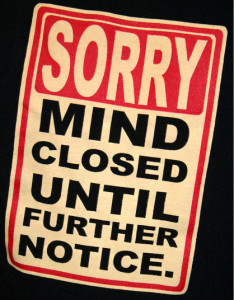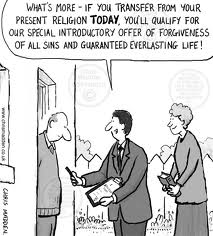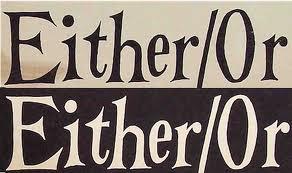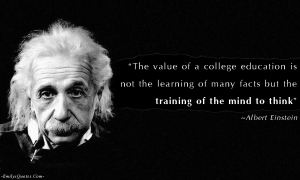 It is worthy of note that today (Friday) the Church Times has a leader entitled Fundamentalism. I have noticed over the years that the word is one that is normally avoided in articles and comments in the paper. I suspect that this reluctance to use the F-word is based on two fears. One is the fear of being misunderstood and the other a fear of giving offence. There are of course some precise definitions linking the word fundamentalism to Christian groups in the USA in the 1920s which stood firmly against the ‘evils’ of modernist tendencies in the church and in society. Also in a looser context the word is sometimes used to describe people of a religious conservative bent you do not like. Many Christians of an evangelical background hate the word and bristle at the thought of being identified with Creationists or with people who work tirelessly to keep women in church under strict control. The Church Times leader, no doubt aware of all the problems of using the word, helpfully provides a definition from a 1992 article. It goes as follows: ‘(fundamentalism is) the belief that there is one set of religious teachings that clearly contains the fundamental, basic, intrinsic, essential, inerrant truth about humanity and deity; that this essential truth is fundamentally opposed by the forces of evil which must be vigorously fought; that this truth must be followed today according to the fundamental, unchangeable practices of the past; and that those who believe and follow these fundamental teachings have a special relationship with the deity.’ The leader comments in its conclusion that such a system of belief for Christians fails in one important way – namely in its attitude to outsiders. Jesus himself gave special attention to those who were unclean, those who could be argued to have the least claim to a ‘special relationship with the deity’.
It is worthy of note that today (Friday) the Church Times has a leader entitled Fundamentalism. I have noticed over the years that the word is one that is normally avoided in articles and comments in the paper. I suspect that this reluctance to use the F-word is based on two fears. One is the fear of being misunderstood and the other a fear of giving offence. There are of course some precise definitions linking the word fundamentalism to Christian groups in the USA in the 1920s which stood firmly against the ‘evils’ of modernist tendencies in the church and in society. Also in a looser context the word is sometimes used to describe people of a religious conservative bent you do not like. Many Christians of an evangelical background hate the word and bristle at the thought of being identified with Creationists or with people who work tirelessly to keep women in church under strict control. The Church Times leader, no doubt aware of all the problems of using the word, helpfully provides a definition from a 1992 article. It goes as follows: ‘(fundamentalism is) the belief that there is one set of religious teachings that clearly contains the fundamental, basic, intrinsic, essential, inerrant truth about humanity and deity; that this essential truth is fundamentally opposed by the forces of evil which must be vigorously fought; that this truth must be followed today according to the fundamental, unchangeable practices of the past; and that those who believe and follow these fundamental teachings have a special relationship with the deity.’ The leader comments in its conclusion that such a system of belief for Christians fails in one important way – namely in its attitude to outsiders. Jesus himself gave special attention to those who were unclean, those who could be argued to have the least claim to a ‘special relationship with the deity’.
It is unsurprising that the press both secular and religious is now using the word and giving particular attention to extremism in religion in the context of the terrible events in France. Philip Collins, the Times columnist, today writes that ‘when people lay claim to certainty about ultimate questions, sooner or later there is going to be trouble. If the truth has been in some way vouchsafed to you by the divinity then dissent is not reasoned disagreement, it is blasphemy. I am no longer an interlocutor, I am an infidel.’ This Times opinion piece can be summed up by some words that I wrote on the topic fifteen years ago. ‘Fundamentalism cannot and will not listen’.
I want to unpack my own pithy definition of fundamentalism, acknowledging that the other quotes I mention with approval provide a background of explanation about this slippery word. My own definition tries to preserve two aspects of the phenomenon of fundamentalism, one to do with the thinking intellect and the other to do with psychology. The extent to which the non-communication is intellectual or emotional will vary in every case. To say that someone cannot listen to another person in a situation of potential dialogue or communication is on some occasions, I believe, to do with a failure at an intellectual level. Here the conservative Christian (or Muslim) cannot deal with more than one explanation of truth. As the CT leader said, ‘there is one set of religious teachings’ for the fundamentalist. If that is true, then logically there will be, as my definition states, an inability to hear or listen to anything else from another person. For someone to be in this place of intellectual deafness is a sad plight. How they end up in this place is not clear but one cause would be a failure to be exposed to the norms of educational process as we understand it in the West. ‘I cannot hear you’ may be statement about a weak education. It may also be the result of a long term conditioning which we recognise as having created a closed mind.
The second part of my definition picks up the emotional and psychological aspect of being a fundamentalist believer. In this second case, the reason for the deafness is that the believer chooses not to listen. Listening or hearing something that would disturb a settled point of view and belief is uncomfortable and to be resisted. According to this way of thinking, discomfort of this kind is interpreted as the forces of evil mounting an attack and these must be vigorously fought. There is of course a desperate need to remain in a place of stability and certainty. Space forbids me going further in my description of the fundamentalist stance beyond the basic observation that there seem to be these two aspects or components, the intellectual and the emotional.
For the final part of this post, I need to say why I believe, as my title suggests, that religious fundamentalism is a place of danger. Most of what I intend to say on this has already been suggested in what has been already written. First, would any of us want to place a child in charge of those who cannot allow the cut and thrust of discussion and debate? Would any of us leave another person with a view on life that denied the possibility of anything new being discovered? Would we ever be happy for ourselves to have our lives controlled by a existing fixed set of rules? Can we imagine that every conversation with another person would have to be checked by an internal censor for fear that it might lead us into areas of unsoundness? The world that I am describing is indeed a place of danger, and the danger arises from the fact that important aspects of a wider humanity are suppressed or denied. When we think about the fundamentalist universe, it is hard to distinguish who is being harmed the most, the abuser (teacher) or the pupil-victim. Simply living in this paranoid universe is opening oneself up to the infection and danger of having one’s full humanity damaged and partly destroyed. How far we are here from a master who said ‘I have come that they may have life, life in all its abundance.’







